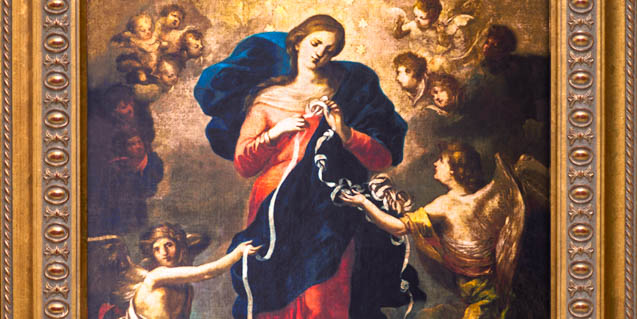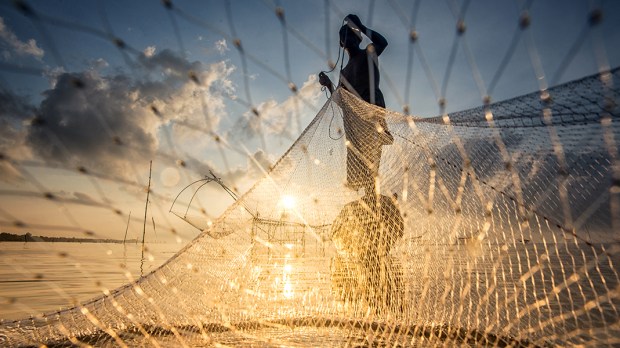Nets. Fishing nets.
When Jesus calls Simon Peter, Andrew, James and John, they are—all four men—with their nets. The nets are the tool of their trade. They were fishermen. But when Christ comes into their lives the nets are left behind.
What is the meaning of the nets? After all, it was not just any trade these apostles would leave behind. They could have been carpenters like the Lord. They could have been tax collectors, like Matthew. But these four are fishermen and the Gospel tells us that they leave their nets. What does it mean? How should we think of the nets?
How many times do we ourselves look at the choices in our lives and think, “that was a mess”?Pope Francis is very fond of an image of Our Lady that he discovered as a student in Germany. In this devotion to the Blessed Mother she is known as “Our Lady, Undoer of Knots.” It brings to mind the phrase from the poet Walter Scott, “O, what a tangled web we weave …” Knots, tangled cords, ropes, lines, wires … they are symbols of the snarls and kinks that, left to our own devices, we so often fill our lives with.

The nets of the fishermen are, similarly, a symbol of life without Christ. The nets get tangled, dirtied, frayed, and rotten. They wear thin. The nets are heavy and burdensome. They demand time and do not necessarily yield a full catch. They are a sign of endeavors we’ve undertaken on our own, as if apart from God, or times when we’ve neglected priorities to chase other things only to end up with our lives in a jumble.
Enter Christ.
The Lord comes into the lives of the fishermen and he transforms the meaning of the nets. In fact, he transforms the nets themselves.
There’s an astonishing painting by the American realist Andrew Wyeth called, “Pentecost.” The image features a net stretched out over a series of poles, drying in the sun. The net, catching the sun’s light, has a golden hue, making it the loveliest net I have seen. Even more striking is the way Wyeth has depicted the wind filling the net, moving it, making it alive.
Life with Christ will transform the lives of the apostles. Taking a worn, dark, and damp net, the grace of God, the Holy Spirit that Christ will send, will transform the nets of these men. The horizon of their lives will be altered. Dark will turn to gold; the lifeless will become alive. The tool itself has been changed. Wyeth’s painting declares all these Gospel truths, and much more.
The apostles live the truths that Christ would declare to those who inquire what it means to follow him. Think of the rich young man who will ask Jesus, “What must I do to gain eternal life?” Jesus instructs the man to sell what he has, to give to the poor, and to follow him (Mt. 19:16). This pattern was set by the apostles who left their nets. They were the first to hear this invitation from the Lord.
The nets show us that it is possible to answer this way of life. The apostles left the nets behind. The knots in our lives can be discarded. Christ can change what they mean. New dimensions of our humanity will be discovered in life with the Lord. John and his brother James were mending their nets; but Christ will mend the cords of our hearts.
The reward for leaving the nets, or as Jesus says elsewhere, “fathers, brothers, sisters, mothers, houses, children, lands,” will be great (Mt. 19:29). The call of the fishermen is to become the new heads of the 12 tribes. This was not revealed to them at first, but the Lord had something very great in store for them. The apostles would be seated in glory, a fulfillment of the first promises made to Israel. Of course the Lord is not asking that we would destroy our lives, but he does demand that we prioritize what is eternal. “Seek first the kingdom …” (Mt. 6:33).
How could they have believed this? John Chrysostom says,
But if you should say, the promise is very great; even for this do I most admire them, for that when they had not as yet seen any sign, they believed in so great a reach of promise, and accounted all but second to that attendance. And this, because they believed that by what words they were caught, by the same they would be able to catch others also.
Their faith was very great. Like us, they received the word of Christ first; only later did they see marvelous signs. They were first caught, as it were, in the net of Christ.
Christ gives the fishermen the strength of faith to be fishers of men. Simon Peter and Andrew were casting their nets into the sea; but Christ will allow the net of faith to be thrown among men. The faith the first apostles have in Jesus is what allows them to catch other souls in the new nets of the Gospel. The golden net of Christ is not a magic thing to be found “out there.” Christ wants to transform our lives. That will convict others. The nets of our hearts where we hold the things dear to God, knotted by hope and charity rather than vice, will catch other men.
Christ chose to take the nets of fishermen from Galilee. There’s nothing He can’t or won’t use to reveal his glory. Surrender your nets. Put them in service to the Kingdom. Be caught in the net of Christ. “Put out to the deep” (Lk. 5:4) and lower your “nets” for a catch.

